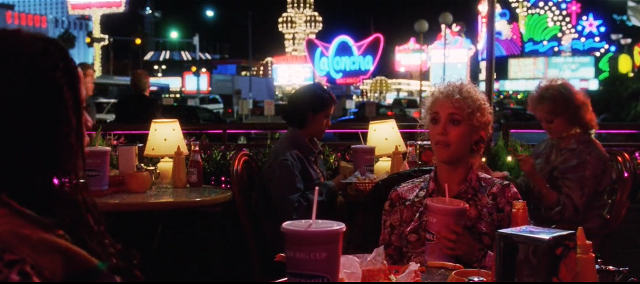For the first hour of this movie, I struggled to decide whether it was a good movie or a bad movie before settling on it being the best possible execution of a bad idea. Based on a sample size of two, it’s clear that Joe Eszterhas hates and fears women, and hates himself for being attracted to them. And like HP Lovecraft, he can’t look away from what he hates and fears – he stares it down, unflinchingly. Unlike most misogynists, Eszterhas has a level of self-awareness in his hatred, where he seems entirely cognisant that obsessing over horny women the way he does makes him at least a little pathetic, and at points it comes off like he’s actively punishing himself with horny women and the pathetic men who fuck them.
Paul Verhoeven, on the other hand, loves women. He thinks they’re interesting; he wants to know about their inner lives and experiences. This leads to an impulse I recognise in myself and in David Willis and in Matthew Weiner: a fascination with ‘difficult women’. This is a world that punishes women for slights both minor and major with greater severity than men; there is a certain type of guy – sensitive, emotional, philosophical – who can’t look away from a woman who lives in it unafraid to be ugly in service of what she thinks is right. A storyteller like that can let their fascination with this woman run away with them to the point of alienating the audience; that happened a bit with Betty Draper on Mad Men (though I think the story plays entirely fair with her and the audience) and I think has happened here.
Because I have to admit, I got kind of sick of the movie about an hour in. Basic Instinct pushed Eszterhas’s self-loathing misogyny to the point of finding a meaningful story; centering itself so solidly on a man choosing to pursue a woman no matter how awful she is, slowly finding his own shallow awfulness, creates meaningful story. There are far fewer choices in Showgirls; a vague arc of Nomi sleazing her way to the top, but no sense of meaningful revelation. As good a director as Verhoeven is – as great as he is at getting every actor to convey at every second what their character is thinking – it feels like he’s indulging both Eszterhas’s absolute hatred of women and Nomi’s absolute commitment to abrasiveness.
(He comes off a lot better as a director of Elizabeth Berkley – her earnestness ends up burning out pretty quickly and I think she carries the movie fine, despite her reputation)
The overall result is all-caps silliness that devolves into white noise; there are occasional moments where it becomes sublime (Julius undersold “It must be weird not having anybody cum on you.”), but it ends up becoming ‘the same, but moreso’. Normally I can even roll with that, but the sheer hatred and degradation of women – I mean, that’s annoying enough in my life, and I’m not even female. I gotta have more story with my camp, you know?

